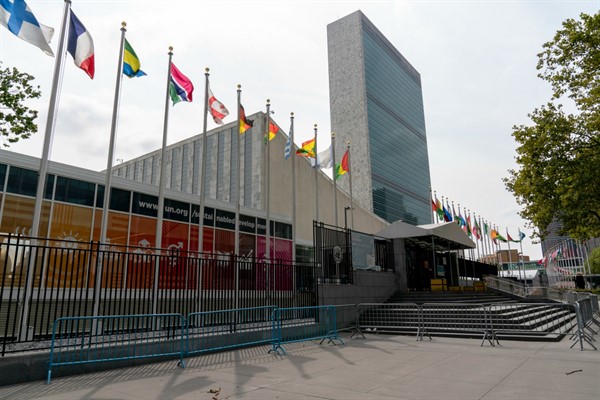The opening of the 75th United Nations General Assembly finds international cooperation in crisis and the U.N. in the crosshairs. Many critiques, especially from the United States, focus on the institution itself, as if it were somehow disembodied from the interests and policies of its major member states. The U.N.’s troubled anniversary is an opportune moment not only to reassess its strengths and weaknesses, but also to temper expectations of what multilateralism can possibly deliver when the U.N.’s leading members turn it into a geopolitical football—or are absent without leave. With these ends in mind, I offer the following 10 propositions.
There are many United Nations. Broad-brush critiques of the U.N. often gloss over the distinct institutional components of the U.N. system, ignoring the relative strengths and weaknesses of each and their utility to the United States. The most important of these are a U.N. Security Council dominated by permanent members, where little gets done without U.S. assent; a General Assembly, with universal membership, that possesses budgetary but little other authority beyond the ability to pass symbolic resolutions; the U.N. Secretariat, which can be a bastion of cronyism but whose performance depends strongly on who is secretary-general; and the multiple specialized and technical agencies, from the International Atomic Energy Agency to the World Food Program, some but not all of which do indispensable work.
The U.N. is no longer the only game in town, but it remains the world’s premier multilateral body. By virtue of its universal membership, binding Charter, multidimensional mandate and primacy in matters of global peace and security, the U.N. remains the foundational bedrock for international cooperation. To be sure, since 1945, nations have created scores of regional and subregional organizations, alliances and informal mini-lateral groupings like the G-7 and G-20 to assist with global governance. Still, nothing else comes close to the U.N. and its many affiliated agencies and bodies—including the Bretton Woods institutions of the World Bank and International Monetary Fund—in terms of their existing technical capabilities and perceived international legitimacy. It is an illusion to imagine that all of these strengths could be recreated on an ad hoc basis.

